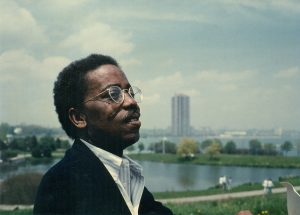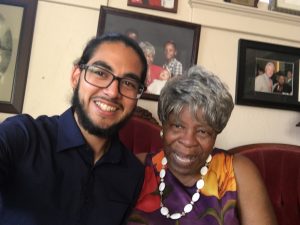calsfoundation@cals.org
A Phone Call, an Opportunity, and an Indelible Connection to Arkansas
I’ll never forget when I got the call.
It was more than ten years ago, the night of April 24, 2010. Earlier that day, I was one of four high school seniors to interview at the offices of the Washington Post—my hometown newspaper—for the Herbert H. Denton Jr. Memorial Scholarship.
At the time, all I knew about Herbert Denton was that he had worked at the paper. I didn’t know that he was the first Black journalist to lead a section of the Post newsroom. I didn’t know that he had mentored dozens of diverse reporters. I didn’t know that he was from Little Rock. All I knew was that this scholarship, named in his memory, would be the difference between tens of thousands of dollars of student debt, and none.
Before taking me into the interview room, the chair of the selection committee, Milton Coleman, told me that the process would be swift. “We’ll only call if you’ve won the scholarship,” he said. “If you don’t hear from us by 10:00 p.m. tonight, you’ll know you haven’t won it.” After the interview, I left the building at 7:00 p.m., crossing paths with the next finalist up.

My phone rang at 9:20. By chance, that night was also the first round of the NFL Draft, which I usually watch on TV every year. I’ll never forget how, as my phone started ringing, I was watching another young man in a suit pick up his phone. He, too, had someone calling to offer the opportunity of a lifetime.
With the money provided by the Denton scholarship, I attended Columbia University. I majored in American studies with an emphasis on African American literature and history, and completed a master’s degree in oral history. All along the way, I was able to put my passions for reading, listening, thinking, and writing ahead of economic necessity, thanks to the Denton scholarship. That was a true blessing.
Every summer I was in college, I would attend the Denton scholarship dinner back in DC, taking the chance to reconnect with previous recipients, to watch the new recipient’s family be honored as mine had been, and to learn about Herbert Denton Jr. from his friends, colleagues, and family members—many of whom also serve on the selection committee. As I progressed through my studies and started to think of myself as a writer, I cherished this event, the community that formed around it, and the inspiration that Herb’s example set for me.
As I was nearing the end of my oral history program, I decided I would try to write a biography of Herbert Denton Jr., based on interviews with people who knew him. This was how I first came to Little Rock. Exactly six years after receiving the scholarship, I loaded up my little Kia Rio and made the fifteen-hour drive from my hometown to Herb’s hometown. It was the first time I can recall looking up the state of Arkansas.
Foolishly, I had planned to spend only one week in Little Rock. But from my first visit to Mt. Pleasant Missionary Baptist Church—where not only Herbert Junior had come up, but so had his father, who was born in 1912—I started to realize that there was much more to the Little Rock piece of Herb Denton’s story, not to mention my own.
That first visit led me to local griot and gadfly Annie Abrams, who had also come of age at Mt. Pleasant. Growing up in Arkadelphia, Herbert Junior’s mother was her cousin. So when she came to Little Rock as a teenager to attend Dunbar Junior High School, she moved in with the Dentons and babysat Herbert Junior. Ms. Abrams gave me the crash course in family values that I needed to understand this foundational part of Herbert Junior’s life. In an oral history interview (which will soon be archived at the CALS Butler Center), she told me, “We wanted to believe that education was the passport to freedom, and human dignity.”

I ended up spending the entire summer of 2016 in Little Rock. I now live here and am focused full-time on learning and telling Herb’s story. In that time, I have quickly learned that the values discussed by Ms. Abrams were not exclusive to the Denton family, but instead emblematic of the neighborhood in which Herbert Junior was raised. Since talking to many other Dunbar and Gibbs Elementary alumni in the past few years, I have come to appreciate the role that Herb’s community played in making a way for me. By way of the scholarship, I, too, am a product of its love of learning and expectations of excellence.
Next week I’ll write more about Herb Denton Jr.’s work in journalism, and my efforts to understand him as a witness to history by way of oral history interviews. Stay tuned!
By Benji de la Piedra, director of the Herbert Denton Community History Project, Central Arkansas Library System




